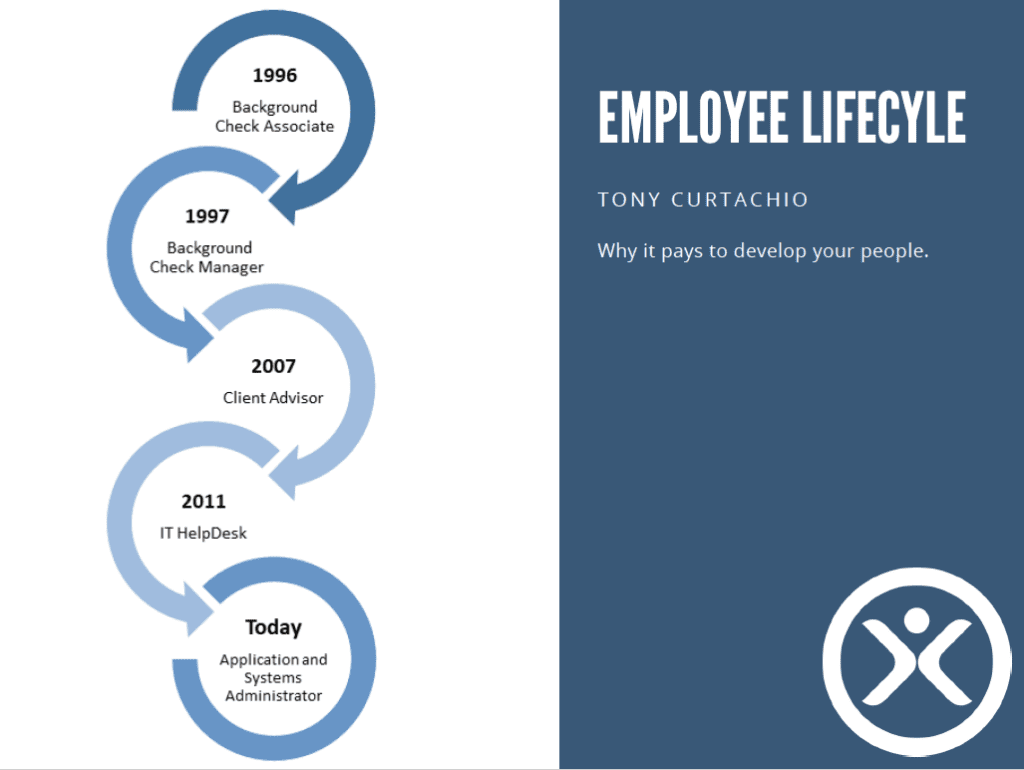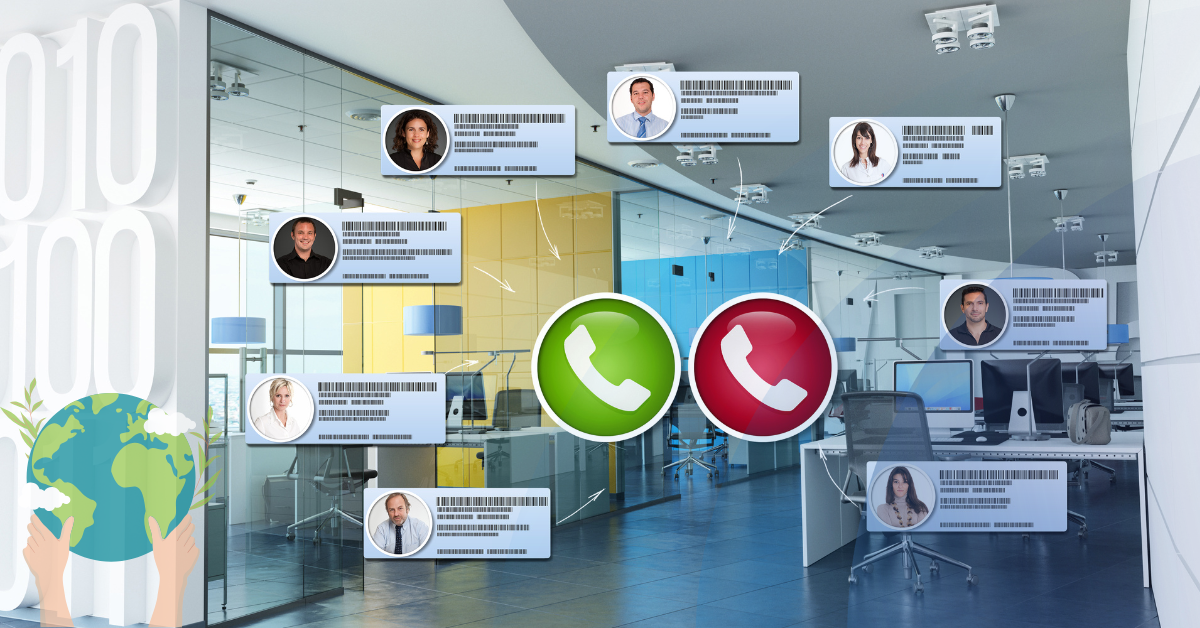Tony Curtachio and Omnia, a true story.
It’s easy to tell when you have a great employee. They are hardworking, always pitch in to help others and go above and beyond each and every time. You know what you have and you don’t want to lose it. But what happens when things change, as things often do, and the department that employee works in is dissolved, sold off or simply no longer of interest to that employee? We suggest taking the change in stride and seeing where else that employee can be of value to the organization — you just never know. Sure, not all moves will have a happy ending, but taking the chance and retraining that employee is worth the gamble. Don’t worry that they don’t have the hard skills or experience for the move they want or for the role you want them to try because you already know what they have at their core, like a strong work ethic, intelligence, a can-do attitude and the right personality attributes for a variety of roles in your organization.
Let me take you on a journey of how sticking it out with a strong employee pays off. This is a true employee lifecycle story; nothing has been added for dramatic effect.
Meet Tony Curtachio.
Tony started with Omnia as a temporary employee doing background searches and basic administrative tasks for our background division. That was back in 1996. Fast forward to today, and he’s still around making our lives easier in his role as our application and systems administrator.
Tony graduated from the University of South Florida with a business degree. Throughout college, he worked retail, which certainly teaches you a thing or two about customer service, teamwork, patience, and long hours. The day after receiving his degree, he was offered a department manager position that looked good on paper but ended up being unfulfilling, on top of even longer hours. Like many younger workers, he stuck to what he knew, working other retail roles before finding his way to a temp agency so he could get office experience and distance himself from retail. That’s where Omnia comes in all those years ago.
Here’s what his employee lifecycle with our organization looks like:
June 1996: Tony took a temp position with Omnia’s background search division.
September 1996: He became a full-time Omnia employee.
1997: Staff roles shifted, and Tony took over as manager of the background search division where he was happily (he told me so) ensconced in his role until 2007.
Tony falls into the Administrator personality group. He’s helpful, team focused, analytical, persistent and detailed, which fits for a few roles at Omnia, luckily (a little foreshadowing for you).
The plot thickens of course, and in 2007, Omnia sold the background search division. Thankfully, leadership knew they would be crazy to let him go.
2007: Tony moved over to the assessment side of the business, specifically as a client advisor. He already knew quite a bit about the assessment, which is Omnia’s core offering, so he breezed through the certification training. It was clear even then that Tony enjoyed technology and the emerging applications. Tony’s new focus through our service team was to create account management plans for our fully automated 720 report, now known as the Target Selection report. Tony’s job was to engage with clients, travel to deliver on-site training presentations and troubleshoot website and other tech issues.
2011: A vacancy in the IT department left Omnia needing a replacement. Due to his clear affinity for technology and his customer service experience, Tony was offered that job in IT to provide helpdesk support internally and externally and eventually acquire deeper technical skills that would enable him to meet other IT needs in the organization. At that point, Tony had no formal IT training or certifications, unlike his predecessor. Was it a gamble? We knew it wasn’t.
2021: This year, we are celebrating Tony’s 25th Omniaversary. Over his last 10 years in IT, he has grown into the role of application and systems administrator, where he continues to provide helpdesk support, but also so much more like database management, programming support (he’s becoming a great programmer in his own right), and the management of 3rd party applications and vendors. Of course, last year he, like the rest of us, he started doing all this from home.

When I asked Tony what brought him to, and kept him at, Omnia, this is what he had to say:
I got very lucky. I was taking it all day by day to see where this new opportunity would go. From day one, the work was “extra” interesting, and when we brought everything online, the technical aspects of that always kept me engaged. Even when I switched over to the assessment division, there were always technical aspects to everything I was doing that I enjoyed.
Year after year, I would see others come and go, some looking for greener pastures, and I always wondered if they were really greener. I also saw several people come back. For myself, I didn’t see other opportunities that could be better than what I had at Omnia. It offered me everything I was looking for in a job and eventually a marketable career. And that’s what really keeps me here. Over the years, I have been able to (and urged to) learn and grow and try out different positions, without needing to start over somewhere else. It’s definitely been like having your cake and eating it too. I’m happy to say I love my job and enjoy working with my co-workers (and friends), and although the pandemic threw the world into havoc, a positive outcome is how easy it was for us to work from home; it’s the cherry on top of that cake I get to eat. I’d like to extend a BIG Thank You to John and Heather Caswell for their appreciation and guidance, as well as many others, but I hear the music playing, and I’m about to be ushered off this page. My advice: look at other opportunities for your staff when things change. My growth over the years has kept me engaged and moving forward in my career without having to move on to another company. If you have an employee who loves the work and your organization, hold on to that.
Thank you, Tony.
Of course, the assessment played a key role in navigating Tony’s career development with Omnia. Over those same years, we had available positions in other areas, like sales. We always need good salespeople (who doesn’t?), but that not only didn’t interest him, it didn’t align with his core traits and preferences as an Administrator. I have no doubt he would have tried it if we asked, but I also think he wouldn’t be working here today if we had done that. That’s just one of the many ways personality data can help throughout an employee’s lifecycle.
So, what’s next for Tony? I’ve been leaning on him for graphic design work lately, and he does not disappoint. Maybe he’ll add that skill to his toolbox next. And the best part is that Omnia reaps the benefits, but as you can tell, so does Tony. We hope he’ll have several more slices of cake!























